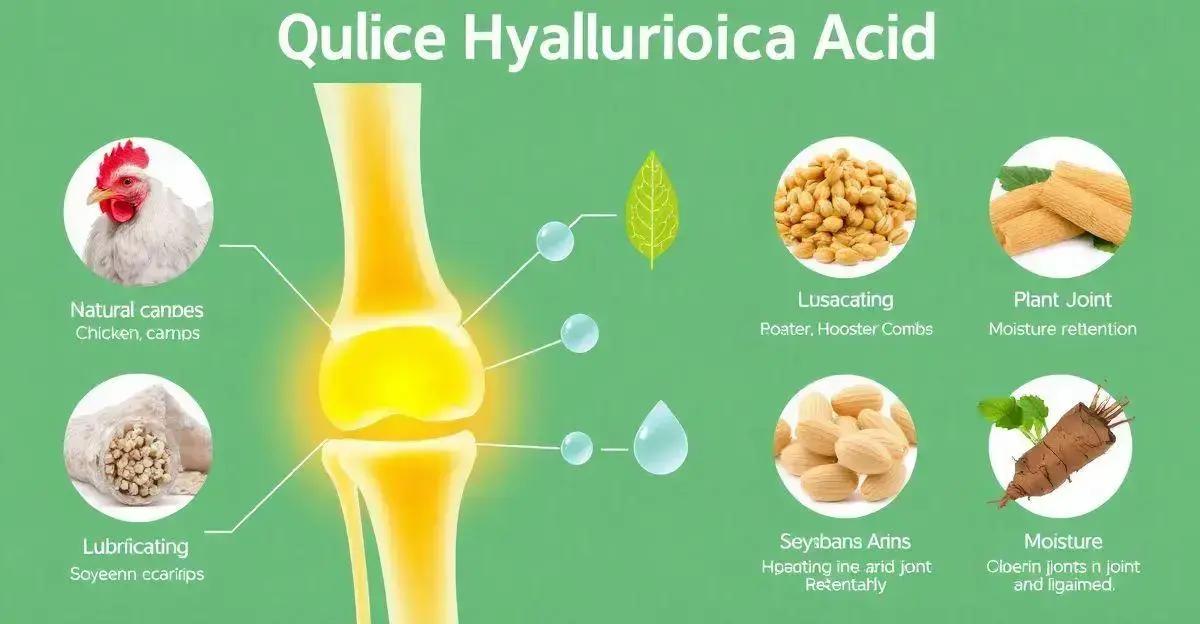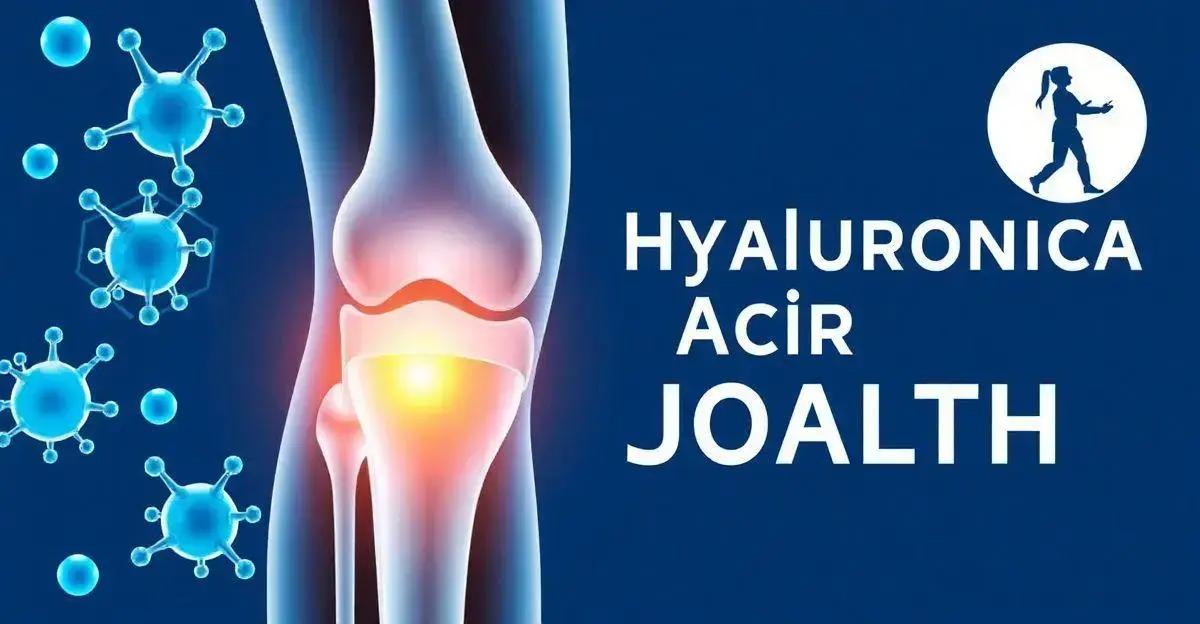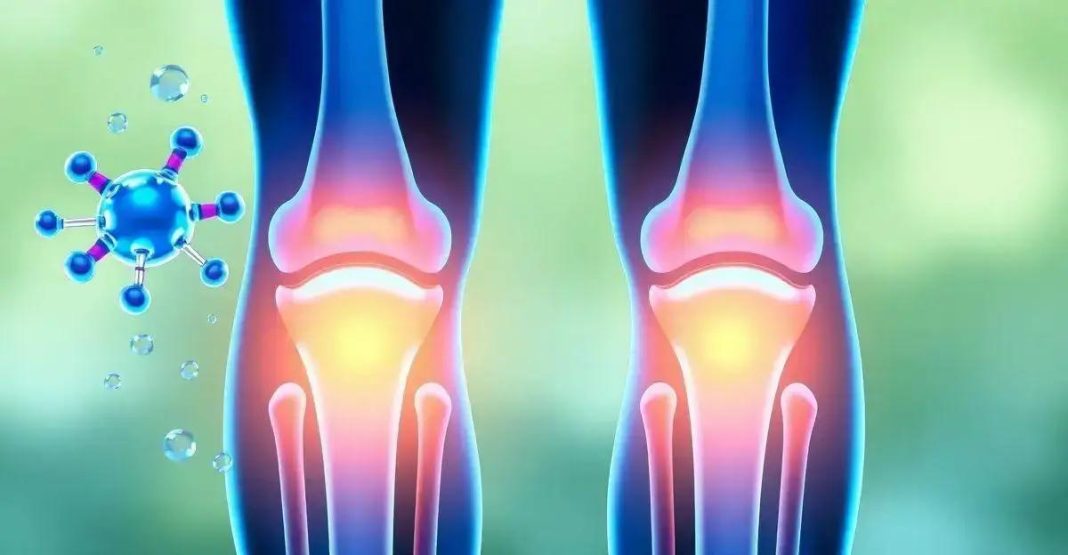Hyaluronic acid is essential for joint health, providing lubrication and hydration to joints and tissues. It helps relieve pain, improve mobility, and reduce inflammation, making it a beneficial supplement for those with joint discomfort. While generally safe, consulting a healthcare professional before use is advised to avoid potential side effects. Incorporating hyaluronic acid into your routine can enhance joint health and overall well-being, promoting a more active lifestyle.
Hyaluronic acid is a naturally occurring substance in the body, known for its ability to retain moisture and lubricate joints. It plays a crucial role in maintaining joint health by providing cushioning and support to cartilage. In this article, we will explore the benefits of hyaluronic acid for joint health, how it works, and how to incorporate it into your routine for optimal joint function.
What is Hyaluronic Acid?
What is Hyaluronic Acid?
Hyaluronic acid is a naturally occurring substance found in the body, primarily in connective tissues, skin, and synovial fluid in joints.
It is a glycosaminoglycan, which is a long chain of sugars that can hold vast amounts of water—up to 1,000 times its weight.
This unique property allows hyaluronic acid to act as a powerful moisturizer and lubricant, making it essential for maintaining hydration and elasticity in tissues.
In the context of joint health, hyaluronic acid plays a critical role by providing cushioning and lubrication within the joints.
It is a key component of synovial fluid, which reduces friction between cartilage surfaces during movement and helps maintain joint integrity.
This lubrication is crucial for preventing wear and tear on the cartilage, especially during physical activities.
As we age, the natural production of hyaluronic acid in the body decreases, which can contribute to joint discomfort and stiffness.
This decline highlights the importance of maintaining adequate levels of hyaluronic acid for overall joint health and function.

The Role of Hyaluronic Acid in Joint Health
The Role of Hyaluronic Acid in Joint Health
Hyaluronic acid plays a vital role in maintaining joint health, particularly through its presence in synovial fluid and cartilage. Here are some key functions and roles of hyaluronic acid in joint health:
- Lubrication: Hyaluronic acid is a major component of synovial fluid, which lubricates the joints. This lubrication reduces friction between the cartilage surfaces during movement, allowing for smooth and pain-free motion.
- Shock Absorption: By providing cushioning in the joints, hyaluronic acid helps absorb shock during physical activities. This is especially important for weight-bearing joints like the knees and hips.
- Maintenance of Cartilage Health: Hyaluronic acid supports the hydration and elasticity of cartilage. Adequate levels of hyaluronic acid help prevent cartilage degeneration and promote overall joint function.
- Reduction of Inflammation: Hyaluronic acid has anti-inflammatory properties that can help reduce inflammation within the joints, contributing to pain relief and improved mobility.
- Support for Joint Repair: Hyaluronic acid may assist in the repair and regeneration of damaged joint tissues, promoting healing and maintaining joint integrity over time.
Overall, hyaluronic acid is essential for ensuring proper joint function and health. Its role in providing lubrication, shock absorption, and maintaining cartilage integrity highlights the importance of adequate hyaluronic acid levels for preventing joint discomfort and promoting an active lifestyle.
Health Benefits of Hyaluronic Acid for Joints
Health Benefits of Hyaluronic Acid for Joints
Hyaluronic acid offers a variety of health benefits specifically for joint health, making it a popular supplement for individuals looking to alleviate discomfort and improve mobility. Here are some key health benefits of hyaluronic acid for joints:
- Joint Lubrication: Hyaluronic acid provides critical lubrication to the joints, reducing friction and allowing for smooth movement. This lubrication helps prevent wear and tear on the cartilage during physical activity.
- Reduction of Joint Pain: By alleviating friction and providing cushioning, hyaluronic acid can help reduce joint pain associated with conditions like osteoarthritis, making daily activities more manageable.
- Improved Joint Function: Supplementing with hyaluronic acid has been shown to enhance joint function and mobility. This improvement allows individuals to engage in physical activities with greater ease and comfort.
- Support for Cartilage Health: Hyaluronic acid promotes hydration and elasticity in cartilage, helping to maintain its structure and integrity. This support is vital for preventing degeneration and maintaining overall joint health.
- Anti-Inflammatory Effects: Hyaluronic acid possesses anti-inflammatory properties that can help reduce inflammation in the joints, contributing to pain relief and improved joint health.
- Enhanced Recovery: For those recovering from joint injuries or surgery, hyaluronic acid may support the healing process by promoting tissue repair and reducing inflammation.
Incorporating hyaluronic acid into your health regimen can provide these benefits, making it a valuable supplement for anyone looking to improve their joint health and overall well-being.

Sources of Hyaluronic Acid
Sources of Hyaluronic Acid
Hyaluronic acid can be obtained from various dietary and supplemental sources. Here are some key sources of hyaluronic acid:
- Animal Sources: Hyaluronic acid is naturally found in animal tissues, particularly in connective tissues such as cartilage and synovial fluid. Consuming foods like chicken skin and bone broth can provide dietary sources of hyaluronic acid.
- Fish and Seafood: Fish and seafood, particularly those with skin, are good sources of hyaluronic acid. Marine sources of collagen often contain elevated levels of hyaluronic acid, which can be beneficial for joint health.
- Vegetable Sources: Certain vegetables, such as root vegetables (like potatoes and sweet potatoes), carrots, and leafy greens (like spinach and kale), contain small amounts of hyaluronic acid and can support its production in the body.
- Fruits: Fruits high in vitamin C, such as oranges, strawberries, and kiwis, can support the body’s natural production of hyaluronic acid, although they do not contain it directly.
- Hyaluronic Acid Supplements: Hyaluronic acid is widely available in supplement form, including capsules, powders, and liquid formulas. These supplements are often derived from animal sources or produced through fermentation processes.
- Skincare Products: While not ingested, topical skincare products containing hyaluronic acid can help hydrate the skin and improve its elasticity, indirectly supporting overall joint health by keeping the skin around the joints supple.
Incorporating these sources of hyaluronic acid into your diet or through supplementation can help enhance your joint health and support overall well-being.
How to Supplement with Hyaluronic Acid
How to Supplement with Hyaluronic Acid
Supplementing with hyaluronic acid can be an effective way to support joint health and overall well-being. Here are some guidelines on how to properly supplement with hyaluronic acid:
- Choose the Right Form: Hyaluronic acid supplements are available in various forms, including capsules, powders, and liquid extracts. Select a form that fits your lifestyle and preferences; powders can easily be mixed into beverages or foods.
- Follow Recommended Dosage: The typical dosage for hyaluronic acid supplementation ranges from 100 mg to 200 mg per day, depending on the specific product and intended benefits. Always follow the manufacturer’s recommended dosage or consult a healthcare provider for personalized advice.
- Incorporate into Your Diet: If using hyaluronic acid powder, mix it into smoothies, soups, or other foods to seamlessly incorporate it into your meals. This not only boosts your nutrient intake but also enhances the overall taste of your food.
- Combine with Other Nutrients: For optimal results, consider combining hyaluronic acid with other supportive nutrients, such as glucosamine and vitamin C, which play crucial roles in joint health and collagen synthesis.
- Be Consistent: Consistency is key when supplementing with hyaluronic acid. Incorporate it into your daily routine for several weeks to observe significant benefits, particularly for joint health and skin hydration.
- Consult with a Healthcare Professional: Before starting any new supplement regimen, particularly if you have existing health conditions or are taking medications, consult with a healthcare provider to ensure safety and effectiveness.
By following these guidelines, you can effectively supplement with hyaluronic acid to support your health and enhance your overall quality of life.

Potential Side Effects and Considerations
Potential Side Effects and Considerations
While hyaluronic acid supplements are generally considered safe for most individuals, it’s important to be aware of potential side effects and considerations before using them. Here are some key points to keep in mind:
- Allergic Reactions: Some individuals may experience allergic reactions to hyaluronic acid supplements, particularly if derived from animal sources. Symptoms can include rash, itching, or gastrointestinal discomfort.
- Gastrointestinal Issues: Mild digestive issues such as bloating, gas, or diarrhea may occur when first taking hyaluronic acid supplements, especially in higher doses.
- Interactions with Medications: Hyaluronic acid may interact with certain medications, particularly anticoagulants (blood thinners). Always consult with a healthcare provider if you are taking other medications to avoid potential interactions.
- Pregnancy and Nursing: The safety of hyaluronic acid supplements during pregnancy and breastfeeding has not been thoroughly studied. It’s advisable to consult with a healthcare professional before using them in these situations.
- Quality of Supplements: The quality of hyaluronic acid supplements can vary significantly between brands. Choose products from reputable manufacturers that undergo third-party testing for purity and potency.
- Dosage Considerations: Always adhere to the recommended dosage provided on the product label. Taking excessive amounts of hyaluronic acid may lead to adverse effects and will not necessarily provide additional benefits.
By being aware of these potential side effects and considerations, you can use hyaluronic acid supplements safely and effectively as part of your health regimen. Always consult with a healthcare professional if you have any concerns or questions.
Conclusion
Conclusion
In conclusion, hyaluronic acid is a vital substance that plays a significant role in maintaining joint health and overall well-being. Its ability to provide lubrication, reduce inflammation, and support cartilage health makes it a valuable supplement for individuals seeking to alleviate joint discomfort and improve mobility.
While generally safe for most individuals, it is important to consider potential side effects and interactions with medications.
Consulting with a healthcare professional before starting any new supplement regimen is advisable, especially for those with existing health conditions or those who are pregnant or nursing.
By understanding the benefits of hyaluronic acid and incorporating it wisely into your health routine, you can enhance your joint health and enjoy a more active, fulfilling lifestyle.
Conclusion
In summary, hyaluronic acid is an essential component for maintaining joint health and function.
Its benefits, including pain relief, improved mobility, and anti-inflammatory properties, make it a popular choice for those dealing with joint discomfort.
While hyaluronic acid supplements are generally safe, it is important to be aware of potential side effects and consult with a healthcare professional before starting any new regimen.
By incorporating hyaluronic acid into your daily routine, you can take proactive steps to support your joint health and overall wellness, allowing you to lead a more active and enjoyable life.
FAQ – Frequently Asked Questions about Hyaluronic Acid
What is hyaluronic acid?
Hyaluronic acid is a naturally occurring substance in the body that provides lubrication and hydration to joints, skin, and other tissues.
How does hyaluronic acid benefit joint health?
Hyaluronic acid helps to lubricate joints, reduce inflammation, and support cartilage health, which can alleviate pain and improve mobility.
What are the common sources of hyaluronic acid?
Common sources include animal tissues, particularly cartilage, as well as supplements available in capsules, powders, and liquid forms.
Are there any side effects of hyaluronic acid supplements?
Potential side effects may include allergic reactions, gastrointestinal discomfort, and interactions with certain medications. Consult a healthcare provider before use.
How can I supplement with hyaluronic acid?
Hyaluronic acid can be supplemented in various forms, including capsules, powders, and liquid extracts. Follow the recommended dosage on the product label.
Is hyaluronic acid safe for everyone?
While generally safe, hyaluronic acid may not be suitable for individuals with specific allergies or those who are pregnant or nursing. Always consult a healthcare professional.


